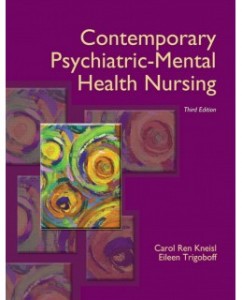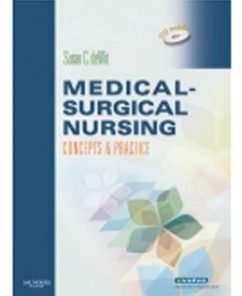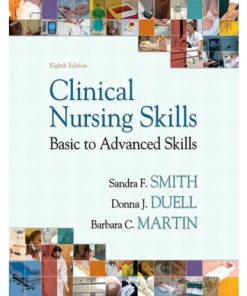Test Bank for Contemporary Psychiatric-Mental Health Nursing, 3rd Edition: Carol R. Kneisl
$35.00 Original price was: $35.00.$26.50Current price is: $26.50.
Test Bank for Contemporary Psychiatric-Mental Health Nursing, 3rd Edition: Carol R. Kneisl
Test Bank for Contemporary Psychiatric-Mental Health Nursing, 3rd Edition: Carol R. Kneisl

Product details:
- ISBN-10 : 0133581608
- ISBN-13 : 978-0133581607
- Author:
CONTEMPORARY PSYCHIATRIC-MENTAL HEALTH NURSING, 3/e is the most up-to-date, evidence-based, culturally competent, authoritative, and comprehensive resource for psychiatric-mental health nursing. The authors emphasize the importance of empathy and client empowerment, while providing the knowledge and clinical competence that psychiatric-mental health nurses can use to help diverse clients heal on both psychobiologic and spiritual levels. They prepare students to tailor and humanize interventions for traditional as well as “new” psychiatric-mental health clients encountered in forensic settings, homeless shelters, and in other community and rehab settings. Since advances in neuroscience and genetics are redefining the scientific understanding of mental disorders, the authors offer a solid grounding in psychobiology, including brain imaging assessment and new psychopharmacologic treatment options. This edition adds a full chapter on Recovery and Psychiatric Rehabilitation Strategies, and many new boxed features showing how psychiatric disorders are portrayed in the news and movies.
Table contents:
- Contemporary Psychiatric–Mental Health Nursing
- About the Authors
- Thank You!
- Preface
- Underlying Themes
- Organization
- New to This Edition
- The Textbook as a Map, a Compass, and an Inspiration
- A Guide to Contemporary Psychiatric–Mental Health Nursing
- Special Features
- Detailed Contents
- Unit 1 Foundations for Psychiatric–Mental Health Nursing Practice
- 1 Mental Health, Mental Disorder, and Psychiatric–Mental Health Clients: Who Are They?
- Learning Outcomes
- Key Terms
- Critical Thinking Challenge
- The Concepts of Deviance, Mental Health, and Mental Disorder
- Deviance
- Clients, Not Patients
- Mental Health
- Mental Disorder
- Mental Disorder as a Global Problem
- Mental Disorders in the United States
- Comorbidity of Mental Disorders
- Care-Seeking Patterns in Mental Health Care
- Cost of Mental Health Care
- Adequacy of Mental Health Care Services
- Mental Disorders Around the Globe
- Historical Perspectives
- Era of Magico–Religious Explanations
- Era of Organic Explanations
- Era of Alienation
- Era of Confinement
- Era of Moral Treatment
- Era of Psychoanalysis
- Contemporary Developments
- The Stigma of Mental Illness
- Language Matters
- References
- 2 Psychiatric–Mental Health Nurses: Who Are They?
- Learning Outcomes
- Key Terms
- Critical Thinking Challenge
- Emergence of the Discipline
- Early Psychiatric Nursing Education
- Moving into the Mainstream
- Psychiatric Nursing as a Specialty
- Role Clarification
- Clinical Nurse Specialist Role
- Fiscal Decline and Retrenchment
- Decade of the Brain
- The New Millennium
- Standards and Levels of Practice
- Basic Level of Practice
- Advanced Level of Practice
- Partnership and Collaboration
- The Mental Health Team
- Cooperation Versus Competition
- Clients and Families
- Nursing’s Theoretic Heritage
- Peplau
- Travelbee
- Paterson and Zderad
- Watson
- Benner
- Implications for Psychiatric–Mental Health Nursing Practice
- References
- 3 Self-Awareness and the Psychiatric–Mental Health Nurse
- Learning Outcomes
- Key Terms
- Critical Thinking Challenge
- Personal Integration
- Creating a Common Ground
- Searching for Meaning
- Feelings: The Affective Self
- Self-Awareness of Feelings
- Problems With Submerged Feelings
- Dominant Emotional Themes
- Acceptance of Disapproved Feelings
- Beliefs and Values
- Dogmatic Belief
- Issues of Blame and Control
- Attitudes and Opinions
- Arriving at Values
- Culture and Social Class
- Sociocultural Heritage
- Avoiding Misdiagnosis
- Taking Care of the Self
- Solitude
- Physical Health
- Sleep Deprivation and Shift Work Disorder
- Attending to Internal Stress Signals
- Burnout
- Cues to Burnout
- Reducing Burnout
- Qualities That Enhance Therapeutic Relationships
- Respect for the Client
- Availability
- Spontaneity
- Hope
- Acceptance
- Sensitivity
- Assertiveness
- Passive Behavior
- Aggressive Behavior
- Assertive Behavior
- Vision
- Accountability
- Advocacy
- Spirituality
- Empathy
- Critical Thinking
- References
- 4 The Therapeutic Nurse–Client Relationship
- Learning Outcomes
- Key Terms
- Critical Thinking Challenge
- The One–to–One Relationship
- Characteristics of Therapeutic Nurse–Client Relationships
- Therapeutic Alliance
- Professional
- Informal Relationships
- Formal Relationships
- Mutually Defined
- Collaborative
- Goal Directed
- Open
- Negotiated
- Committed
- Culturally Sensitive
- Phenomena Occurring in One–to–One Relationships
- Resistance
- Evaluating Behavior as Resistive
- General Intervention Strategies With Resistance
- Acting Out as Resistance
- Intervention Strategies With Acting Out
- Transference
- Positive Transference
- Negative Transference
- Countertransference
- Conflict Between Caretaker and Therapist Roles
- Critical Distance
- Gift Giving
- Use of Touch
- Self-Disclosure
- Culture, Values, and Beliefs
- Nursing Process Orientation (Beginning) Phase
- Assessment
- Subjective Data
- Objective Data
- The Initial Interview
- Nursing Diagnosis: NANDA
- Outcome Identification: NOC
- Planning and Implementation: NIC
- Developing the Therapeutic Contract
- Establishing Trust
- Keeping Confidentiality
- Tuning In to Process
- Addressing the Client’s Suffering
- Clarifying Purpose, Roles, and Responsibilities
- Gift Giving During the Orientation Phase
- Evaluation
- Nursing Process Working (Middle) Phase
- Assessment
- Nursing Diagnosis: NANDA
- Outcome Identification: NOC
- Planning and Implementation: NIC
- Testing the Effect of New Behaviors
- Implementing Problem-Solving Strategies
- Challenging the Client’s Resistance to Change
- Gift Giving During the Working Phase
- Evaluation
- Nursing Process Termination (End) Phase
- Assessment
- Nurse’s Self-Awareness
- Nursing Diagnosis: NANDA
- Outcome Identification: NOC
- Planning and Implementation: NIC
- Intervening in Specific Client Termination Behaviors
- Providing for an Explicit and Therapeutic Good-Bye
- Gift Giving During the Termination Phase
- Referring the Client for Follow-Up
- Evaluation
- Clinical Supervision
- Case Management
- Community-Based Care
- Home Care
- References
- Unit 2 Theoretical Basis for Psychiatric–Mental Health Nursing Practice
- 5 Theories for Interdisciplinary Care in Psychiatry
- Learning Outcomes
- Key Terms
- Critical Thinking Challenge
- Scope of Psychiatric–Mental Health Nursing Practice
- Humanistic Interactionism and Psychobiology: The Mind–Body–Spirit Connection
- Basic Premises of Interactionism
- Implications for Psychiatric–Mental Health Nursing Practice
- The First Premise: Behavior Is Purposeful
- The Second Premise: Different Meanings for Different People
- The Third Premise: Meanings Arise in One’s Social World
- The Fourth Premise: Meaning Is Individually Inter preted
- The Fifth Premise: Self as a Valued Object
- The Sixth Premise: New Ways of Being
- The Seventh Premise: Culture Shapes Conduct
- Basic Premises of Humanism
- Implications for Psychiatric–Mental Health Nursing Practice
- A Holistic View of the Mind–Body Relationship
- An Expanded Role for Nurses
- Negotiation and Advocacy
- Basic Premises of Psychobiology
- Implications for Psychiatric–Mental Health Nursing Practice
- Theories for Interdisciplinary Psychiatric Care
- Medical–Psychobiologic Theory
- Assumptions and Key Ideas
- Implications for Psychiatric–Mental Health Nursing Practice
- Psychoanalytic Theory
- Assumptions and Key Ideas
- Psychic Determinism
- Role of the Unconscious
- Psychoanalysis
- Structure of the Mind
- Instinctual Drives
- The Oedipus Complex and the Electra Complex
- Decline of Freudian Psychoanalysis
- Implications for Psychiatric–Mental Health Nursing Practice
- Cognitive–Behavioral Theory
- Assumptions and Key Ideas
- Implications for Psychiatric–Mental Health Nursing Practice
- Social–Interpersonal Theories
- Assumptions and Key Ideas
- Interpersonal–Psychiatric Theory: Harry Stack Sullivan
- Hierarchy of Basic Human Needs: Abraham Maslow
- Client-Centered Therapy: Carl Rogers
- Developmental Theory of Personality: Erik Erikson
- General Systems Theory
- Implications for Psychiatric–Mental Health Nursing Practice
- References
- 6 The Biologic Basis of Behavioral and Mental Disorders
- Learning Outcomes
- Key Terms
- Critical Thinking Challenge
- Brain, Mind, and Behavior
- Neuroanatomy
- Cerebrum
- Frontal Lobe
- Temporal Lobe
- Parietal Lobe
- Occipital Lobe
- Limbic System
- Amygdala
- Hippocampus
- Reticular Activating System
- Extrapyramidal System
- Diencephalon
- Thalamus
- Hypothalamus
- Pituitary Gland
- Basal Ganglia
- Cerebellum
- Brain Stem
- Medulla Oblongata
- Pons
- Midbrain
- Autonomic Nervous System
- Genetics
- Gene Structure
- Gene Function
- Genetic Research
- Ethics in Genetic Research
- The Genetic Basis of Psychiatric Illness
- Neurons, Synapses, and Neurotransmission
- Synaptic Transmission
- Neurotransmitters
- Dopamine
- Norepinephrine
- Serotonin
- Acetylcholine
- Histamine
- Amino Acids
- Psychoendocrinology and Psychoneuroimmunology
- Endocrine System
- Irregularities of Neuroendocrine Function
- Neuropeptides
- Immune System
- Kindling and Behavioral Sensitization
- Circadian Rhythms
- Circadian Sleep Rhythm Disorders
- Jet Lag Type
- Delayed Sleep Phase Type
- Advanced Sleep Phase Type
- Psychobiology and Mental Disorders
- Schizophrenia
- Neuron Loss
- Cognitive Abnormalities
- Molecular Genetics
- Structural Brain Abnormalities
- Genetic Alterations
- Stress–Diathesis Model
- Mood Disorders
- Anxiety Disorders
- Panic Disorder
- Obsessive–Compulsive Disorder (OCD)
- Dementia of the Alzheimer’s Type (DAT)
- Neurobiology
- Genetics
- Personality Disorders
- Neurobiology
- Neurochemistry
- Genetics
- Substance-Related Disorders
- Psychobiology and Nursing
- References
- 7 The Science of Psychopharmacology
- Learning Outcomes
- Key Terms
- Critical Thinking Challenge
- Psychopharmacology and Nursing
- Neuroleptics and Psychotropics
- Biologic Impact on Ethnically Distinct Groups
- Antipsychotic Medications
- Basic Mechanisms of Action
- Major Effects
- The Choice of a Specific Medication
- Newer Antipsychotics
- Clozapine (Clozaril)
- Risperidone (Risperdal)
- Dosage
- The Decision to Use a Medication
- Special Considerations
- Unique Routes of Administration
- Potential Side Effects of Antipsychotic Medications
- Metabolizing Psychiatric Medications
- Antidepressant Medications
- Psychobiologic Considerations
- Tricyclic Antidepressants (TCAs)
- Monoamine Oxidase Inhibitors (MAOIs)
- Selective Serotonin Reuptake Inhibitors (SSRIs)
- Serotonin and Norepinephrine Reuptake Inhibitors (SNRIs)
- Other Medications Used for Depression
- Age-Related Considerations
- Mood Stabilizers
- Dosage
- Psychobiology of Lithium
- Anxiolytic Medications
- Effects
- Meprobamate
- Benzodiazepines and Nonbenzodiazepines
- New Medications
- Uses for Anxiolytics
- Psychobiology of Anxiolytic Medications
- Treatment for Insomnia
- Treatment of Dat
- Acetylcholinesterase Inhibitors
- Glutamate Pathway Modifier
- Medication Counterfeiting
- Herbal Medicines
- Assessing Herb Consumption
- References
- 8 Stress, Anxiety, and Coping
- Learning Outcomes
- Key Terms
- Critical Thinking Challenge
- Stress
- Conflict as a Stressor
- Approach–Avoidance Conflict
- Avoidance–Avoidance Conflict
- Approach–Approach Conflict
- Biopsychosocial Theories of Stress
- The Fight-or-Flight Response to Stress
- Selye’s Stress–Adaptation Theory
- Life Changes as Stressful Events
- Application to Clinical Practice
- Stress as a Transaction
- Psychoneuroimmunology Framework
- Self-Healing Personalities
- Hardiness, Resilience, and Health
- Disease-Prone Personalities
- Anxiety
- Neurobiologic Basis of Anxiety
- Sources of Anxiety
- Anxiety as a Continuum
- Mild Anxiety
- Moderate Anxiety
- Severe Anxiety
- Panic
- Assessing Anxiety
- Physiological Dimension
- Cognitive Dimension
- Emotional/Behavioral Dimension
- Coping with Stress and Anxiety
- Everyday Ways of Coping With Stress
- Seeking Comfort
- Relying on Self-Discipline
- Intense Expression of Feeling
- Avoidance and Withdrawal
- Talking It Out
- Privately Thinking It Through
- Working It Off
- Engaging in Self-Healing Mind–Body Practices
- Spirituality and Prayerfulness
- Using Symbolic Substitutes
- Somatizing
- Defense-Oriented Ways of Coping: Defense Mechanisms
- Repression
- Nursing Intervention Strategies
- Regression
- Nursing Intervention Strategies
- Suppression
- Nursing Intervention Strategies
- Dissociation
- Nursing Intervention Strategies
- Identification
- Nursing Intervention Strategies
- Introjection
- Nursing Intervention Strategies
- Projection
- Nursing Intervention Strategies
- Denial
- Nursing Intervention Strategies
- Fantasy
- Nursing Intervention Strategies
- Rationalization
- Nursing Intervention Strategies
- Reaction Formation
- Nursing Intervention Strategies
- Displacement
- Nursing Intervention Strategies
- Undoing
- Nursing Intervention Strategies
- Intellectualization
- Nursing Intervention Strategies
- Psychological Factors Affecting Medical Conditions
- Holistic Theory of Illness
- Selected Conditions Affected by Psychological Factors
- Gastrointestinal Disorders
- Peptic Ulcer
- Inflammatory Bowel Disorders
- Cardiovascular Disorders
- Endocrine Disorders
- Asthma
- Arthritis
- Headache
- Skin Disorders
- Resistance to Psychosocial Intervention
- References
- 9 Cultural Competence
- Learning Outcomes
- Key Terms
- Critical Thinking Challenge
- Developing an Understanding of Cultural Competence
- Cultural Competence
- Worldview
- Ethnicity and Ethnocentrism
- Cultural Sensitivity
- Cultural Values
- Cross-Cultural Communication
- Language and Dialect
- Working With an Interpreter
- Degree of Literacy
- Other Cultural Phenomena Affecting Health and Health Care
- Control Over One’s Environment
- Biologic Variations
- Social Organization
- Space
- Time Orientation
- Cultural Assessment
- Degree of Acculturation
- Heritage Assessment
- Transcultural Care Planning
- Culture Brokering
- The Nurse-as-Culture-Broker
- Conditions That Affect Brokering
- Stages of Culture Brokering
- Developing Cultural Competence in Nursing Practice
- General Strategies for Developing Cultural Competence
- Developing Cultural Competence With Specific Cultural Groups
- Culturally Competent Health Care Promotion and Disease Prevention Programs
- Cultural Risk Factors for Mental Disorder
- Gender Differences
- Age
- Social Class and Poverty
- Ethnicity
- Marital Status
- Physical Health Status
- Positive Family History
- Season of Birth
- Adverse Life Events
- Physical Environment
- Lifestyle Habits
- Culture and Culture-Bound Syndromes in the DSM
- Advocating Issues of Cultural Diversity in Nursing
- Nursing Practice
- Nursing Research
- Nursing Education
- References
- Unit 3 Psychiatric– Mental Health Nursing Processes
- 10 Therapeutic Communication
- Learning Outcomes
- Key Terms
- Critical Thinking Challenge
- The Process of Human Communication
- Role of Perception
- Role of Values
- Role of Culture
- The Spoken Word
- Denotation and Connotation
- Private and Shared Meanings
- Nonverbal Messages
- Body Movement
- Voice Quality and Nonlanguage Sounds
- Personal and Social Space
- Touch
- Cultural Artifacts
- Verbal and Nonverbal Links
- Biopsychosocial Theories And Models Of Human Communication
- Symbolic Interactionist Model
- Neurobiologic Factors
- Therapeutic Communication Theory
- Basic Concepts
- Successful Versus Disturbed Communication
- Efficiency
- Appropriateness
- Flexibility
- Feedback
- Behavioral Effects and Human Communication Theory
- Communication Levels
- Communication Disturbances
- Neurolinguistic Programming Theory
- Determining the Sensory Modality
- Preferred Predicates
- Eye-Accessing Cues
- Gross Hand Movements
- Breathing Pattern
- Speech Pattern and Voice Tones
- Therapeutic Use of NLP
- Facilitating Communication And Building A Relationship
- Superficiality Versus Intimacy
- Facilitating Intimacy
- Responding With Empathy
- Responding With Respect
- Responding With Genuineness
- Responding With Immediacy
- Responding With Warmth
- Therapeutic Communication Skills
- Speaking to the Hard of Hearing
- Empathizing
- Active Listening
- Using Silence
- Reflecting
- Reflecting Content
- Reflecting Feelings
- Imparting Information
- Avoiding Self-Disclosure
- Clarifying
- Paraphrasing
- Checking Perceptions
- Questioning
- Structuring
- Pinpointing
- Linking
- Giving Feedback
- Confronting
- Summarizing
- Processing
- Common Mistakes
- Circumventing Potential Cultural Barriers To Communication
- References
- 11 Psychiatric–Mental Health Assessment
- Learning Outcomes
- Key Terms
- Critical Thinking Challenge
- The Nursing Role in Assessment
- Psychiatric Examination
- Psychiatric History
- Data Sources
- Mental Status Examination
- General Behavior, Appearance, and Attitude
- Characteristics of Speech
- Mutism
- Circumstantiality
- Perseveration
- Flight of Ideas
- Blocking
- Emotional State
- Content of Thought
- Orientation
- Memory
- General Intellectual Level
- Abstract Thinking
- Insight Evaluation
- Summary
- Mini-Mental State Exam
- Nurses’ Observation Scale for Inpatient Evaluations
- Physiological Assessment
- Biologic History Taking
- Observation
- Neurologic Assessment
- Brain Imaging Techniques
- Psychological Testing
- Personality Tests
- Objective Personality Tests
- Projective Personality Tests
- Cognitive Function Tests
- Common Cognitive Function Tests
- Psychiatric Diagnostic Practice According to the DSM
- Basic Principles of the Multiaxial System
- Description of the Axes
- Axis I: Clinical Disorders
- Axis II: Personality Disorders
- Axis III: General Medical Conditions
- Axis IV: Psychosocial and Environmental Problems
- Axis V: Global Assessment of Functioning
- Psychosocial Assessment
- Individual Assessment
- The Place of Assessment in Practice
- Nursing Care Plans
- Critical Pathways
- Algorithms
- Quality Assurance
- References
- 12 Ethics, Clients’ Rights, and Legal and Forensic Issues
- Learning Outcomes
- Key Terms
- Critical Thinking Challenge
- Ethics
- Ethical Analysis
- Principles of Bioethics
- Autonomy
- Beneficence
- Fidelity
- Justice
- Nonmaleficence
- Veracity
- Neuroethics: An Emerging Field
- Ethical Guidelines for Psychiatric–Mental Health Nurses
- Clinical Judgment and Ethical Reasoning
- Ethical Dilemmas in Psychiatric–Mental Health Nursing
- Stigma of Psychiatric Diagnoses
- Need for Diagnostic Labels
- Nurse’s Moral Stance on Diagnoses
- Control of Individual Freedom
- Violence Against Others
- Suicide
- Psychosurgery
- Psychotropic Medications
- Restraints
- Client Privacy and Confidentiality
- Legislation, Commitment, and Hospitalization Issues
- Admission and Commitment Categories
- Voluntary Admission
- Involuntary Commitment
- Emergency
- Temporary or Observational
- Extended or Indeterminate
- Involuntary Outpatient Commitment
- Ethical Dilemmas of Involuntary Hospitalization
- Discharge or Separation Categories
- Discharge
- Conditional
- Absolute
- Transfer
- Escape
- Psychiatry and Criminal Law
- Determining Legal Sanity
- M’Naghten Rule
- Irresistible Impulse
- American Law Institute Model Penal Code
- Guilty but Mentally Ill
- Diminished Capacity
- Competence to Stand Trial
- Psychiatric Forensic Nursing
- Dimensions of Practice
- Role Credibility
- Roles and Functions
- Forensic Examiner
- Competency Therapist
- Expert Witness
- Consultant to Attorneys
- Consultant to Law Enforcement
- Correctional Mental Health Nursing
- Client Rights
- Right to Informed Consent
- Right to Treatment
- Right to Refuse Treatment
- Ethical Dilemmas
- Right to Treatment in the Least Restrictive Setting
- Treatment Setting
- Institutional Policy
- Enforcement
- Treatment
- Client Characteristics
- Right to Communicate With Others
- Right Not to Be Subjected to Unnecessary Mechanical Restraints
- Right to Privacy
- Privileged Communication
- Disclosure to Safeguard Others
- Right to Periodic Review
- Right to Independent Psychiatric Examination
- Right to Participate in Legal Matters
- Contracts
- Wills
- Marriage and Divorce
- Voting
- Right to Drive
- Right to Practice a Profession
- Right to Habeas Corpus
- Rights of Children or Minors
- Psychiatric Advance Directives
- Liability and the Psychiatric–Mental Health Nurse
- Negligence
- Conditions for Establishing Negligence
- Contract for Care
- Duty of Care
- Presence of Harm
- Common Practice
- Boundary Violation
- Acting Against the Nurse’s Advice
- Malpractice
- Need to Document
- Client Advocacy
- Physical and Psychological Abuse of Clients
- Advocacy Interventions
- Duty to Intervene
- Contract for Care
- Assessment
- Responsibility to Communicate and Collaborate
- Formulating a Plan to Intervene
- Illegal, Immoral, or Unethical Activities of Professionals
- References
- 13 Creating Hospital and Community-Based Therapeutic Environments
- Learning Outcomes
- Key Terms
- Critical Thinking Challenge
- Deinstitutionalization and the Community Mental Health Movement
- The Therapeutic Environment in Hospital-Based Care
- Admission Criteria
- A Unique Role for Nurses
- External Factors Affecting the Treatment Environment
- Privacy
- Autonomy
- Safety
- Group Well-Being
- Therapeutic Environment Principles
- Restrictiveness
- Orienting the Client and Family
- Safety and the Structural Environment
- Program Structure
- Program Rules
- Community Meetings
- Client Government
- Supportive Social Climate
- Spirituality
- Encouraging a Partnership With Clients and Families
- Establishing a Daily Schedule
- Using Positive Communication Skills
- Identifying and Participating in Support Groups
- Recognizing Illness Relapse or Exacerbation
- The Therapeutic Environment in Community-Based Care
- Community Mental Health Centers
- Mobile Outreach Units
- Assertive Community Treatment (ACT)
- Psychiatric Home Care
- Managed Mental Health Care
- Managed Care Settings
- Inpatient Settings
- Shorter, More Intense Stays
- Critical Pathways
- Primary Care Centers
- Triage Services
- Employer-Based Clinics
- Unique Aspects of MCOs
- Legal Issues
- Treatment Adherence
- Medication Adherence
- MCO Member Expectations
- Continuity of Care
- Ethics in Managed Mental Health Care
- Case Management
- Case Manager Role
- Gatekeeping and Facilitating
- Client Advocacy
- Assessment Phase Challenges
- Planning Phase Challenges
- Implementation Phase Challenges
- Evaluation Phase Challenges
- References
- Unit 4 Clients With Mental Disorders
- 14 Cognitive Disorders
- Learning Outcomes
- Key Terms
- Critical Thinking Challenge
- Delirium
- Signs of Delirium
- Cognition
- Attention and Wakefulness
- Psychomotor Behavior
- Differentiating Delirium from Dementia and Depression
- Dementia
- Dementia of the Alzheimer’s Type (DAT)
- Signs of Dementia of the Alzheimer’s Type (DAT)
- Progression of Dementia of the Alzheimer’s Type (DAT)
- Treatment for DAT
- Dementia With Lewy Bodies
- Vascular Dementia
- Parkinson’s Disease (PD)
- Huntington’s Disease
- Pick’s Disease
- Creutzfeldt–Jakob Disease (CJD)
- New Variant Creutzfeldt–Jakob Disease (nvCJD)
- Binswanger’s Disease (BD)
- Pseudodementia
- Medical Conditions Affecting Cognition
- Focal Brain Processes
- Medication Side Effects
- HIV-Associated Dementia
- Amnestic Disorder
- Biopsychosocial Theories
- Nursing Process Clients With Cognitive Disorders
- Assessment
- Subjective Data
- Cognitive Functioning
- Nursing Diagnoses: NANDA
- Impaired Physical Mobility
- Self-Care Deficit: Bathing/Hygiene, Dressing/Grooming, Feeding, Toileting
- Readiness for Enhanced Sleep
- Disturbed Thought Processes
- Impaired Verbal Communication
- Risk for Self-Directed Violence and Risk for Other-Directed Violence
- Ineffective Role Performance
- Disturbed Sensory Perception
- Risk for Situational Low Self-Esteem
- Functional Urinary Incontinence, Bowel Incontinence
- Imbalanced Nutrition, Less Than Body Requirements
- Outcome Identification: NOC
- Planning and Implementation: NIC
- Promoting Normal Motor Behavior
- Maintaining Self-Care
- Promoting Adequate Sleep
- Supporting Knowledge Processes
- Supporting Optimal Memory Functioning
- Promoting Optimal Medication Management
- Promoting Optimal Orientation
- Supporting Optimal Verbal Expression
- Supporting Appropriate Conduct/Impulse Control
- Supporting Optimal Role Performance
- Maintaining Optimal Attention Span
- Promoting Optimal Self-Concept/Self-Esteem
- Supporting Optimal Perceptual Functioning
- Promoting Optimal Patterns of Elimination
- Promoting Optimal Nutritional Status
- Evaluation
- Delirium Evaluation Criteria
- Dementia Evaluation Criteria
- Case Management
- Community-Based Care
- Home Care
- References
- 15 Substance-Related Disorders
- Learning Outcomes
- Key Terms
- Critical Thinking Challenge
- Substance-Related Disorders
- Substance Abuse
- Substance Dependence
- Substance Intoxication
- Substance Withdrawal
- Substance-Induced Sleep Disorders
- Biopsychosocial Theories
- Biologic/Genetic Theories
- Psychological Theories
- Sociocultural Theories
- Family Systems Theories
- Dysfunctional Family Roles
- Alcohol
- The Effects of Alcohol
- Patterns of Use
- Alcohol Withdrawal Syndrome
- Hangover
- Alcoholic Hallucinosis
- Generalized Seizures
- Delirium Tremens
- Withdrawal from Alcohol and Medical Treatment
- Minor Withdrawal
- Major Withdrawal
- Treatment of Withdrawal
- Blackouts
- Alcohol-Induced Persisting Amnestic Disorder
- Alcoholic Encephalopathy
- Fetal Alcohol Syndrome
- Suicide and Alcoholism
- Barbiturates or Similarly Acting Sedatives or Hypnotics
- The Effects of Barbiturates, Sedatives, or Hypnotics
- Patterns of Use
- Action
- Withdrawal
- Opioids
- The Effects of Opioids
- Patterns of Use
- Overdose
- Withdrawal
- Treatment
- Amphetamines or Similarly Acting Sympathomimetics
- The Effects of Amphetamines
- Patterns of Use
- Methamphetamine
- Withdrawal
- Cannabis
- The Effects of Cannabis
- Patterns of Use
- Cocaine
- The Effects of Cocaine
- Cocaine Intoxication
- The “Post-Coke” Blues
- Patterns of Use
- Treatment
- Crack
- Symptoms of Crack Use
- Freebase
- Phencyclidine (PCP)
- The Effects of PCP
- Treatment
- Hallucinogens
- The Effects of Hallucinogens
- Treatment
- Bad Trips
- Flashbacks
- Inhalants
- The Effects of Inhalants
- Patterns of Use
- Treatment
- Nicotine
- The Effects of Nicotine
- Patterns of Use
- Treatment
- Caffeine
- The Effects of Caffeine
- Patterns of Use
- Treatment
- Polydrug Use
- Designer Drugs
- Groups at Risk for Substance Abuse
- Teenagers
- Psychiatric Clients With Coexisting Substance Abuse Disorders
- Gender Differences
- Biologic Aspects
- General Hospital Clients
- Older Adults
- Adult Children of Alcoholics
- Health Care Providers
- Nursing Process Clients With Substance-Related Disorders
- Assessment
- Subjective Data
- Objective Data
- Nursing Diagnoses: NANDA
- Outcome Identification: NOC
- Planning and Implementation: NIC
- General Hospital Care
- Specialty Hospital Care
- Residential Rehabilitation
- Extended Residential Care
- Outpatient Care
- Self-Help Groups
- Relapse
- General Treatment Approaches
- Helping the Family
- Evaluation
- Case Management
- Community-Based Care
- Home Care
- References
- 16 Schizophrenia
- Learning Outcomes
- Key Terms
- Critical Thinking Challenge
- Symptoms of Schizophrenia
- Positive Symptoms
- Hallucinations
- Delusions
- Disordered Speech and Behavior
- Negative Symptoms
- Flat Affect
- Alogia
- Avolition
- Anhedonia
- Recognizing the Presence of Negative Symptoms
- Subtypes of Schizophrenia
- Paranoid Type
- Disorganized Type
- Catatonic Type
- Undifferentiated Type
- Residual Type
- Somatic Treatments
- Relapse
- Other Psychotic Disorders
- Schizophreniform Disorder
- Schizoaffective Disorder
- Delusional Disorder
- Brief Psychotic Disorder
- Additional Psychotic Disorders
- Biopsychosocial Theories
- Biologic Theories
- Genetic Theories
- Brain Structure Abnormalities
- Biochemical Theories
- Psychological Theories
- Information Processing
- Attention and Arousal
- Family Theories
- Humanistic–Interactional Theories
- Stress–Vulnerability Model
- Resources That Moderate Stress
- Nursing Process Clients With Schizophrenia
- Assessment
- Subjective Data
- Objective Data
- Nursing Diagnosis: NANDA
- Impaired Communication
- Self-Care Deficits
- Activity Intolerance
- Social Isolation
- Decisional Conflict
- Disturbed Sensory Perception
- Disturbed Body Image
- Excess Fluid Volume
- Disturbed Thought Processes
- Dysfunctional Family Processes
- Interrupted Family Processes
- Outcome Identification: NOC
- Planning and Implementation: NIC
- Preventing Relapse
- Promoting Adequate Communication
- Promoting Adherence With Medication Regimen
- Assisting With Grooming and Hygiene
- Promoting Organized Behavior
- Promoting Social Interaction and Activity
- Promoting Social Skills and Activities
- Intervening With Hallucinations and Delusions
- Promoting Congruent Emotional Responses
- Promoting Family Understanding and Involvement
- Promoting Community Contacts
- Evaluation
- Communication
- Self-Care
- Activity Intolerance
- Social Isolation
- Sensory/Perceptual Alterations
- Thought Processes
- Emotional Responses
- Family Functioning
- Case Management
- Community-Based Care
- Home Care
- References
- 17 Mood Disorders
- Learning Outcomes
- Key Terms
- Critical Thinking Challenge
- Major Depressive Episode/Disorder
- Dysthymic Disorder
- Seasonal Affective Disorder
- Bipolar Disorders
- Manic and Hypomanic Episodes
- Depressed Episodes
- Mixed Episodes
- Cyclothymic Disorder
- Mood Disorders Due to Other Conditions
- Postpartum Mood Episodes
- Bereavement
- Dysfunctional Grieving
- Biopsychosocial Theories
- Psychoanalytic Theory
- Cognitive Theory
- Biologic Theories
- Gender and Age
- Genetic Theories
- Biochemical Theories
- Biologic Rhythms
- Psychological Factors
- Sociocultural Factors
- Nursing Process Clients With Major Depressive Disorders
- Assessment
- Subjective Data
- Objective Data
- Nursing Diagnosis: NANDA
- Risk for Self-Directed Violence
- Situational Low Self-Esteem or Chronic Low Self-Esteem
- Hopelessness
- Social Isolation
- Outcome Identification: NOC
- Risk for Self-Directed Violence
- Situational Low Self-Esteem or Chronic Low Self-Esteem
- Hopelessness
- Social Isolation
- Planning and Implementation: NIC
- Preventing Suicide and Promoting Safety
- Promoting Self-Esteem
- Instilling Hope
- Enhancing Socialization
- Administering Medications
- Monitoring Electroconvulsive Therapy
- Evaluation
- Impulse Control and Suicide Self-Restraint
- Self-Esteem
- Hopelessness
- Social Involvement
- Case Management
- Community-Based Care
- Home Care
- Nursing Process Clients With Bipolar Disorders
- Assessment
- Subjective Data
- Objective Data
- Nursing Diagnosis: NANDA
- Risk for Injury
- Disturbed Thought Processes
- Impaired Social Interaction
- Self-Care Deficit
- Sleep Deprivation
- Outcome Identification: NOC
- Risk for Injury
- Disturbed Thought Processes
- Impaired Social Interaction
- Self-Care Deficit
- Sleep Deprivation
- Planning and Implementation: NIC
- Promoting Client Safety
- Administering Medications
- Intervening With Delusions and Hallucinations
- Enhancing Socialization
- Monitoring Intake and Output and Promoting Nutrition
- Promoting Improved Self-Care
- Enhancing Rest and Sleep
- Evaluation
- Risk for Injury
- Cognitive Orientation and Reality-Based Thinking
- Social Interaction Skills
- Intake, Output, and Nutrition
- Self-Care
- Rest and Sleep
- Case Management, Community-Based Care, And Home Care
- References
- 18 Anxiety Disorders
- Learning Outcomes
- Key Terms
- Critical Thinking Challenge
- ANXIETY DISORDERS
- Panic Disorder
- Phobic Disorders
- Agoraphobia
- Social Phobia
- Specific Phobia
- Generalized Anxiety Disorder
- Obsessive–Compulsive Disorder
- Pediatric Autoimmune Neuropsychiatric Disorders Associated With Streptococci (PANDAS)
- Post-Traumatic Stress Disorder
- Acute Stress Disorder
- BIOPSYCHOSOCIAL THEORIES
- Biologic Factors
- Genetic Theories
- Psychosocial Theories
- Behavioral Theories
- Humanistic Theories
- The Nursing Process Clients With Anxiety Disorders
- Assessment
- Subjective Data
- Objective Data
- Nursing Diagnosis: NANDA
- Fear
- Anxiety
- Ineffective Coping
- Ineffective Role Performance
- Impaired Verbal Communication
- Risk for Trauma
- Disturbed Thought Processes and Disturbed Sensory Perception
- Ineffective Tissue Perfusion
- Insomnia
- Outcome Identification: NOC
- Planning and Implementation: NIC
- Reducing Fear
- Reducing Anxiety
- Teaching Clients About Medications
- Promoting Effective Coping
- Interventions for Clients Experiencing Obsessive–Compulsive Disorder
- Interventions for Clients Experiencing Post-Traumatic Stress Disorder
- Interventions for Clients Experiencing Phobic Disorders
- Promoting Effective Communication
- Promoting Safety
- Promoting Optimal Tissue Perfusion
- Promoting Effective Sensory Perception and Thought Processes
- Promoting Sleep
- Evaluation
- Anxiety
- Individual Coping
- Role Performance
- Communication and Safety
- Thought Processes and Sensory Perception
- Tissue Perfusion
- Sleep
- CASE MANAGEMENT
- COMMUNITY-BASED CARE
- HOME CARE
- References
- 19 Dissociative, Somatoform, and Factitious Disorders
- Learning Outcomes
- Key Terms
- Critical Thinking Challenge
- Dissociative Disorders
- Dissociative Amnesia
- Dissociative Fugue
- Dissociative Identity Disorder
- Depersonalization Disorder
- Biopsychosocial Theories
- Biologic and Genetic Factors
- Psychosocial Theories
- Behavioral Theories
- Humanistic Theories
- The Nursing Process Clients With Dissociative Disorders
- Assessment
- Subjective Data
- Objective Data
- Nursing Diagnosis: NANDA
- Disturbed Sensory Perception and Disturbed Thought Processes
- Ineffective Role Performance
- Ineffective Coping
- Outcome Identification: NOC
- Planning and Implementation: NIC
- Promoting Improved Sensory Perception and Thought Processes
- Promoting Effective Role Performance
- Promoting Effective Coping
- Evaluation
- Sensory Perception and Thought Processes
- Role Performance
- Individual Coping
- Case Management
- Community-Based Care
- Home Care
- Somatoform Disorders
- Somatization Disorder
- Conversion Disorder
- Pain Disorder
- Hypochondriasis
- Body Dysmorphic Disorder
- Undifferentiated Somatoform Disorder
- Malingering
- Factitious Disorder
- Factitious Disorder by Proxy
- Biopsychosocial Theories
- Biologic Factors
- Genetic Theories
- Psychosocial Theories
- Humanistic Theories
- Nursing Process Clients With Somatoform Disorders
- Assessment
- Subjective Data
- Objective Data
- Nursing Diagnosis: NANDA
- Impaired Verbal Communication
- Ineffective Role Performance and Compromised Family Coping
- Ineffective Coping
- Disturbed Thought Processes and Disturbed Sensory Perception
- Outcome Identification: NOC
- Planning and Implementation: NIC
- Promoting Effective Communication
- Promoting Improved Role Performance and Family Coping
- Promoting Effective Coping
- Promoting Improved Perception and Thought Processes
- Evaluation
- Communication
- Role Performance and Family Coping
- Coping
- Perception and Thought Processes
- Case Management
- Community-Based Care
- Home Care
- References
- 20 Gender Identity and Sexual Disorders
- Learning Outcomes
- Key Terms
- Critical Thinking Challenge
- Gender And Transgender
- Gender Identity
- Gender Roles
- Disorders of Sexual Development
- Transsexuals
- Cross-Dressers
- Paraphilias
- Fetishism
- Transvestic Fetishism
- Sadism and Masochism (S/M)
- Exhibitionism, Voyeurism, and Frotteurism
- Pedophilia
- Altered Sexual Function
- Sexual Desire Disorders
- Hypoactive Sexual Desire Disorder
- Sexual Aversion Disorder
- Sexual Arousal Disorders
- Orgasmic Disorders
- Female Orgasmic Disorder
- Male Orgasmic Disorder
- Premature Ejaculation
- Sexual Pain Disorder
- Dyspareunia
- Vaginismus
- Increased Sexual Interest
- Sexual Addiction
- Biopsychosocial Theories
- Biologic Theory
- Intrapersonal Theory
- Behavioral Theory
- Interpersonal Factors
- Sociocultural Factors
- Nursing Process Clients With Sexual Problems
- Assessment
- Subjective Data
- Objective Data
- Erectile Capacity
- Nursing Diagnosis: NANDA
- Anxiety and Fear
- Spiritual Distress
- Compromised Family Coping
- Disturbed Personal Identity
- Ineffective Role Performance
- Ineffective Sexuality Pattern
- Risk for Violence: Self-Directed or Other-Directed
- Pain
- Deficient Knowledge
- Sexual Dysfunction
- Outcome Identification: NOC
- Planning and Implementation: NIC
- Using the PLISSIT Model
- Giving Permission
- Supplying Information
- Suggesting Adaptations
- Referring for Intensive Therapy
- Reducing Violence Against the Self
- Reducing Violence Against Others
- Promoting Comfort With Gender Identity
- Reducing Pain
- Educating About Noncoercive Sex Patterns
- Reinforcing Sexual Health
- Managing Compulsive Sexual Behavior
- Addressing Sexual Dysfunctions
- Enhancing Communication
- Reducing Spiritual Distress
- Increasing Knowledge
- Evaluation
- Violence
- Gender Identity
- Pain
- Noncoercive Sexuality Patterns
- Compulsive Sexual Behavior
- Sexual Dysfunction
- Spiritual Distress
- Case Management
- Community-Based Care
- Home Care
- References
- 21 Eating Disorders
- Learning Outcomes
- Key Terms
- Critical Thinking Challenge
- Anorexia Nervosa
- Bulimia Nervosa
- Biopsychosocial Theories
- Psychoanalytic Theory
- Family Systems Theory
- Cognitive–Behavioral Theories
- Sociocultural Theory
- Biologic Theory
- Nursing Process The Client with Anorexia Nervosa
- Assessment
- Subjective Data
- Objective Data
- Nursing Diagnosis: NANDA
- Imbalanced Nutrition: Less Than Body Requirements
- Ineffective Individual Coping
- Disturbed Body Image
- Chronic Low Self-Esteem
- Outcome Identification: NOC
- Imbalanced Nutrition: Less Than Body Requirements
- Ineffective Individual Coping
- Disturbed Body Image
- Chronic Low Self-Esteem
- Planning and Implementation: NIC
- Managing Nutrition
- Facilitating Coping
- Enhancing Body Image
- Improving Self-Esteem
- Evaluation
- Nutritional Status
- Coping
- Body Image
- Self-Esteem
- Case Management
- Community-Based Care
- Home Care
- Nursing Process The Client with Bulimia Nervosa
- Assessment
- Subjective Data
- Objective Data
- Nursing Diagnosis: NANDA
- Anxiety
- Deficient Fluid Volume
- Ineffective Individual Coping
- Compromised Family Coping
- Outcome Identification: NOC
- Anxiety
- Deficient Fluid Volume
- Ineffective Individual Coping
- Compromised Family Coping
- Planning and Implementation: NIC
- Managing Medication
- Reducing Anxiety
- Managing Fluids and Electrolytes
- Facilitating Coping
- Mobilizing the Family
- Evaluation
- Anxiety
- Fluid Volume
- Individual Coping
- Family Coping
- Case Management, Community-Based Care, and Home Care
- References
- 22 Personality Disorders
- Learning Outcomes
- Key Terms
- Critical Thinking Challenge
- PERSONALITY DISORDERS
- Cluster A Personality Disorders: Odd–Eccentric
- Paranoid Personality Disorder
- Suspiciousness and Mistrust
- Rigidity
- Hypervigilance
- Distortions of Reality
- Projection
- Restricted Affect
- Alienation
- Schizoid Personality Disorder
- Schizotypal Personality Disorder
- Cluster B Personality Disorders: Dramatic–Emotional
- Borderline Personality Disorder
- Impulsivity
- Intense Anger
- Identity Diffusion
- Unstable Interpersonal Relationships
- Affective Instability
- Feelings of Emptiness and Aloneness
- Self-Mutilation
- Distortions of Reality
- Histrionic Personality Disorder
- Dramatic, Exhibitionistic, and Egocentric Responses
- Dysfunctional Interpersonal Relationships
- Impaired Sexual Expression
- Dysphoric Mood
- Cognitive Alterations
- Impaired Health Patterns
- Narcissistic Personality Disorder
- Grandiosity
- Exhibitionism
- Labile Affective Response
- Dysfunctional Interpersonal Relationships
- Impaired Sexual Expression
- Antisocial Personality Disorder
- Cluster C Personality Disorders: Anxious–Fearful
- Avoidant Personality Disorder
- Dependent Personality Disorder
- Obsessive–Compulsive Personality Disorder
- Biopsychosocial Theories
- Biologic Factors
- Genetic Theories
- Psychosocial Theories
- Humanistic Theories
- NURSING SELF-AWARENESS
- Nursing Process Clients With Cluster A (Odd–Eccentric) Personality Disorders
- Assessment
- Nursing Diagnosis: NANDA
- Outcome Identification: NOC
- Planning and Implementation: NIC
- Anger and Aggressive Behavior
- Evaluation
- Nursing Process Clients With Cluster B (Dramatic–Emotional) Personality Disorders
- Assessment
- Nursing Diagnosis: NANDA
- Outcome Identification: NOC
- Planning and Implementation: NIC
- Manipulation
- Impulsiveness
- Self-Destructive Behavior
- Evaluation
- Nursing Process Clients With Cluster C (Anxious–Fearful) Personality Disorders
- Assessment
- Nursing Diagnosis: NANDA
- Outcome Identification: NOC
- Planning and Implementation: NIC
- Impaired Social Interaction
- Chronic Low Self-Esteem
- Evaluation
- CASE MANAGEMENT
- COMMUNITY-BASED CARE
- HOME CARE
- References
- Unit 5 Vulnerable Populations
- 23 Clients at Risk for Suicide and Self-Destructive Behavior
- Learning Outcomes
- Key Terms
- Critical Thinking Challenge
- Self-Destructive Behavior
- Ethics and Suicide
- Meaning and Motivation in Suicide
- Biopsychosocial Theories
- Sociocultural Theory
- Age and Gender
- Alcohol and Substance Use
- Ethnicity
- Interpersonal and Intrapsychic Theory
- Biologic Theory
- Neurotransmitter Receptor Hypothesis
- Genetics
- Cognitive Theory
- Suicide Prevention
- Risk Factors and Protective Factors
- National Suicide Prevention Initiative
- Suicide Hotlines and Crisis Centers
- Nursing Self-Awareness
- Nursing Process The Suicidal or Self-Destructive Client
- Assessment
- Clues or Cries for Help
- Lethality Assessment
- Nursing Diagnosis: NANDA
- Outcome Identification: NOC
- Planning and Implementation: NIC
- General Guidelines for Any Setting
- General Guidelines for the Emergency Department
- Suicide Precautions/Restrictive Status
- Monitoring Safety of the Therapeutic Environment
- Documenting Client Behavior and Treatment
- Working With Families
- Evaluation
- Case Management
- Community-Based Care
- Home Care
- Survivors of Suicide
- Family and Friends Who Are Survivors
- Child and Adolescent Survivors
- Cluster Suicide
- Staff Survivors of Client Suicide
- References
- 24 Intrafamily Violence: Physical and Sexual Abuse
- Learning Outcomes
- Key Terms
- Critical Thinking Challenge
- Intrafamily Violence: Physical Abuse
- Sibling Abuse
- Child Abuse
- Shaken Baby Syndrome
- Child Neglect
- Homicide of Child
- Homicide of Parent
- Partner Abuse—Heterosexual
- Partner Abuse—Homosexual
- Elder Abuse
- Emotional Abuse
- Abuse of Pregnant Women
- Stalking
- Cycle of Violence
- BIOPSYCHOSOCIAL THEORIES
- Neurobiologic Theory
- Intrapersonal Theory
- Social Learning Theory
- Gender Bias Theory
- Nursing Process Intrafamily Physical Abuse
- Assessment
- Nursing Diagnosis: NANDA
- Outcome Identification: NOC
- Planning and Implementation: NIC
- Providing Psychoeducation
- Treating the Abuser
- Evaluation
- Case Management
- Community-Based Care
- Home Care
- Intrafamily Violence: Sexual Abuse
- Types of Offenders
- Juvenile Offenders
- Male Offenders
- Female Offenders
- Abusive Behavior Patterns
- Child Victims
- Adult Survivors
- Sexual Difficulties
- Self-Mutilation
- Memory of Sexual Abuse
- Biopsychosocial Theories
- Intrapersonal Theory
- Family Systems Theory
- Nursing Process Intrafamily Sexual Abuse
- Assessment
- Nursing Diagnosis: NANDA
- Outcome Identification: NOC
- Planning and Implementation: NIC
- Working With Children
- Empowering Survivors
- Supporting Spiritual Recovery
- Increasing Self-Esteem
- Reducing Anxiety
- Facilitating Healing
- Evaluation
- Case Management
- Community-Based Care and Home Care
- References
- 25 Children
- Learning Outcomes
- Key Terms
- Critical Thinking Challenge
- Child Psychiatric–Mental Health Nursing as a Specialty
- Developmental Disorders
- Intellectual Developmental Disorders
- Specific Developmental Disorders
- Learning Disorders
- Motor Skills Disorder
- Communication Disorders
- Autism Spectrum Disorders
- Autistic Disorder
- Rett’s Disorder
- Childhood Disintegrative Disorder
- Asperger’s Disorder
- Attention Deficit And Disruptive Behavior Disorders
- Attention Deficit Hyperactivity Disorder
- Conduct Disorder
- Oppositional Defiant Disorder
- Feeding And Eating Disorders
- Pica
- Rumination Disorder
- Feeding Disorder of Infancy or Early Childhood
- Reactive Attachment Disorder of Infancy or Early Childhood
- Separation Anxiety Disorder
- Elimination Disorders
- Encopresis
- Enuresis
- Other Important Disorders of Infancy or Childhood
- Selective Mutism
- Stereotypic Movement Disorder
- Tic Disorders
- Tourette’s Disorder
- Chronic Versus Transient Tic Disorders
- Adult Disorders That May Begin In Childhood
- Anxiety Disorders
- Mood Disorders
- Schizophrenia
- Biopsychosocial Theories
- Psychodynamic Theory
- Attachment Theory
- Cognitive–Behavioral Theory
- Biologic Theory
- Neurobiologic Factors
- Nervous System Responsiveness
- Neuroendocrine Reactivity
- Genetic Predisposition
- Perinatal Complications
- Brain Structure and Function
- Multicausal Model
- Nursing Process Children
- Assessment
- Cultural and Developmental Context
- The History-Taking Interview
- Clinical Assessment of a Child
- Assessing Possible Maltreatment
- Assessing Suicide Risk
- Nursing Diagnosis: NANDA
- Outcome Identification: NOC
- Planning and Implementation: NIC
- Therapeutic Approaches
- Psychopharmacology
- Responding to Suicide Risk
- Evaluation
- Nursing Self-Awareness
- Case Management
- Community-Based Care
- Home Care
- References
- 26 Adolescents
- Learning Outcomes
- Key Terms
- Critical Thinking Challenge
- Mental Disorders and Adolescents
- Biopsychosocial Theories
- Biologic Theory
- Neurobiology and Biochemistry
- Chronic Illness
- Psychopharmacology
- Developmental Theory
- Humanistic–Interactionist Theory
- The Role of the Nurse
- In Outpatient Settings
- Community Health Nurse
- Within the School
- Within Community-Based Care
- Within Social Programs
- Nurse Counselor/Therapist
- Individual Therapist
- Group Therapist
- Family Therapist
- In the Inpatient Setting
- Staff Nurse in a General Hospital Setting
- Consultant in a General Hospital Setting
- Staff Nurse or Advanced Practice Nurse in a Psychiatric Setting
- Milieu Therapist
- Nursing Process Adolescents
- Assessment
- Acting Out
- Communication
- Anger and Hostility
- Anxiety and Resistance
- Seduction and Manipulation of the Nurse
- Sexual Behavior of the Adolescent
- Dietary Problems and Eating Disorders
- Depression and Suicide
- Substance Use and Abuse
- Nursing Diagnosis: NANDA
- Outcome Identification: NOC
- Planning and Implementation: NIC
- Prevention Plans
- Establishing a Contract With the Adolescent
- Moderating Anger and Hostility
- Moderate Testing and Setting Limits
- Reducing Scapegoating
- Reducing Bullying
- Managing Sexual Behaviors
- Reducing Substance Abuse
- Evaluation
- Case Management, Community-Based Care, and Home Care
- References
- 27 Elders
- Learning Outcomes
- Key Terms
- Critical Thinking Challenge
- Roadblocks to Mental Health Services for Elders
- Ageism
- Myths
- Stigma
- Health Care Financing
- Biopsychosocial Theories of Aging
- Biologic Theories
- Genetic Theory
- Wear-and-Tear Theory
- Immunology Theory
- Nutritional Theory
- Environmental Theory
- Psychosocial Theories
- Activity Theory
- Disengagement Theory
- Psychiatric Disorders in Elders
- Dementia
- Mood Disorders
- Depression in Elders
- Suicide Among Elders
- Schizophrenia
- Adjustment Disorders
- Anxiety Disorders
- Delusional Disorders
- Substance-Related Disorders
- Disorders of Arousal and Sleep
- Palliative and End-of-Life Issues with Mentally Ill Elders
- Precepts of Palliative Care
- Spirituality and End-of-Life Care
- Nursing Process Elders
- Assessment
- The Assessment Interview
- Biologic Assessment
- Cognitive Status
- Psychological/Emotional Status
- Strengths and Coping Strategies
- Sexuality
- Social and Financial Status
- Elder Abuse
- Nursing Diagnosis: NANDA
- Major Depression
- Adjustment Disorder
- Anxiety Disorders
- Delusional Disorders
- Impaired Social Interaction
- Outcome Identification: NOC
- Improvement in Disturbed Thought Processes
- Renewed Hope and Self-Acceptance
- Resumption of Self-Care and Health Maintenance
- Appropriately Paced Activity, Rest, and Psychomotor Activity
- Pleasure in Eating and Normal Weight
- Decreased Preoccupation With Death and Dying
- Planning and Implementation: NIC
- Reminiscence Therapy and Life Review
- Reality Orientation
- Socialization Enhancement
- Animal-Assisted Therapy
- Exercise and Movement Therapy
- Support Groups
- Medication Administration
- Evaluation
- Case Management, Community-Based Care, and Home Care
- Restorative Care
- Community-Based Programs
- Resistance to Care
- References
- Unit 6 Intervention Strategies
- 28 Therapeutic Groups
- Learning Outcomes
- Key Terms
- Critical Thinking Challenge
- Small Group Dynamics
- Trust
- Self-Disclosure and Self-Awareness
- Relations Within the Group
- Cohesion
- Group Roles and Leadership
- Power and Influence
- Group Developmental Phases
- Forming
- Storming
- Norming
- Performing
- Terminating
- Group Development Theory
- Three Basic Interpersonal Needs
- Inclusion
- Control
- Affection
- Interpersonal Group Phases
- Inclusion Phase
- Control Phase
- Affection Phase
- Interweaving of Phases
- Group Therapy Theory
- Advantages of Group Therapy
- Qualifications of Group Therapists
- The Curative Factors
- Types of Group Leadership
- Single Therapist Approach
- Cotherapy Approach
- Junior–Senior Cotherapy
- Egalitarian Cotherapy
- Creating the Group
- Selecting Members
- Selection Interviews
- Group Contract
- Goals and Purposes
- Time, Length, and Frequency of Meetings
- Place of Meetings
- Starting and Ending Dates
- Addition of New Members
- Attendance
- Confidentiality
- Member Interaction Outside of the Group
- Participation of Members and Therapists
- Fees
- Stages in Therapy Group Development
- Here-and-Now Emphasis
- Steering the Group into the Here-and-Now
- Illuminating the Process
- Therapeutic Groups
- Mutual-Help Groups
- Psychoeducation Groups
- Medication Teaching Groups
- Social Skills Training Groups
- Groups of Medically Ill Clients and Their Families
- Activity Therapy Groups
- Poetry Therapy Groups
- Art Therapy Groups
- Music Therapy Groups
- Dance Therapy Groups
- Bibliotherapy Groups
- Storytelling Groups
- Community Client Groups
- Groups With Nurse Colleagues
- References
- 29 Family-Focused Interventions
- Learning Outcomes
- Key Terms
- Critical Thinking Challenge
- Nursing Self-Awareness
- Family Dynamics
- Family Structures
- Family Life Cycle
- Family Characteristics and Dynamics
- Family Roles
- Family Boundaries
- Power Structure
- Relationship Strains or Conflicts
- Relationship and Communication Intricacies in Families
- Self-Fulfilling Prophecy and Life Scripts
- Family Myths and Themes
- Family Coalitions
- Deviations in the Adult Partners’ Coalition
- Schism
- Skew
- Enmeshment
- Disengagement
- Pseudomutuality and Pseudohostility
- Family Assessment
- Demographic Information
- Medical and Mental Health History
- Family Interactional Data
- Family Burden
- What Families Want from Mental Health Professionals
- Family System Data
- Needs, Goals, Values, and Aspirations
- Family Genogram
- Cultural Family Genogram
- Spiritual Family Genogram
- Forensic Family Genogram
- Family Interventions
- Family Psychoeducation
- Referral to NAMI
- Family Therapy
- Forms of Family Therapy
- Qualifications of Family Therapists
- The Unit of Treatment
- Contract or Goal Negotiation
- Intervention
- Terminating Family Therapy
- References
- 30 Cognitive and Behavioral Interventions
- Learning Outcomes
- Key Terms
- Critical Thinking Challenge
- Cognitive Therapy
- Basic Concepts
- Attributions
- Modeling
- Self-Efficacy
- Cognitive Therapy Techniques
- Positive Imagery
- Mastery Imagery
- Negative Imagery
- Attribution Restructuring
- Behavior Therapy
- Classical Conditioning
- Operant Conditioning
- Rational Emotive Behavioral Therapy
- Behavior Modification
- Response Prevention
- Systematic Desensitization
- Cognitive–Behavioral Therapy
- Thought Stopping
- Dialectical–Behavioral Therapy
- Cultural Aspects of Cognitive and Behavioral Interventions
- Nursing Process Behavioral Contracting
- Assessment
- Nursing Diagnosis: NANDA
- Outcome Identification: NOC
- Planning and Implementation: NIC
- Forming Practical and Measurable Objectives and Goals
- Negotiating a Behavioral Contract
- Providing Physiologic Support With Medications
- Evaluation
- Case Management
- Community-Based Care and Home Care
- References
- 31 Psychopharmacologic Nursing Interventions
- Learning Outcomes
- Key Terms
- Critical Thinking Challenge
- The Nursing Role in Psychopharmacology
- Assessing Clients
- Administering Medications
- Assessing, Documenting, and Evaluating the Effects of Medications
- Educating Clients and Families
- Addressing Individual Differences
- Evaluating the Teaching–Learning Process
- Ethical Concerns
- Children and Adolescents
- Elders
- Pharmaceutical Advertising
- Conflicts of Interest
- Right to Refuse Medications
- The Client’s Cultural Perspective
- Cultural Self-Awareness of Nurses
- Ethnicity and Metabolism of Psychiatric Medications
- Nursing Responsibilities with Antipsychotics
- Autonomic Nervous System Side Effects
- Constipation
- Orthostatic Hypotension
- Extrapyramidal Side Effects
- Acute Dystonic Reactions
- Parkinsonian Syndrome
- Akathisia
- Tardive Dyskinesia
- Prophylactic Treatment of EPSEs
- Assessment of EPSEs
- Sedation and Reduction of the Seizure Threshhold
- Allergic Effects
- Cardiac Effects
- Blood, Skin, and Eye Effects
- Endocrine Effects
- Weight Gain
- Neuroleptic Malignant Syndrome
- Client and Family Education
- Nursing Responsibilities with Antidepressants
- Side Effects of TCAs
- Overdose Effects of TCAs
- Side Effects of Monoamine Oxidase Inhibitors (MAOIs)
- Side Effects of Selective Serotonin Reuptake Inhibitors (SSRIs)
- Side Effects of Serotonin and Norepinephrine Reuptake Inhibitors (SNRIs)
- Age-Related Considerations With Antidepressants
- Client and Family Education
- Nursing Responsibilities with Mood Stabilizers
- Lithium Carbonate
- Nursing Responsibilities with Anxiolytics
- Side Effects
- Client and Family Education
- Nursing Responsibilities with Medications for Dementia
- Nursing Responsibilities with Herbal Medicines
- Assessing Herbal Consumption
- Incompatibilities and Uncommon Medication Combinations
- Adherence Issues
- References
- 32 Recovery and Psychiatric Rehabilitation Strategies
- Learning Outcomes
- Key Terms
- Critical Thinking Challenge
- Readiness for Recovery
- Prochaska Transtheoretical Model for Change
- Realistic and Attainable Expectations of Change
- Psychiatric Disability
- People Who Are Seriously and Persistently Mentally Ill (SPMI)
- Natural Life History of a Disorder
- Stage of Susceptibility
- Stage of Presymptomatic Disorder
- Stage of Clinical Disorder
- Stage of Disability
- Community Support Programs for SPMI
- Case Management
- Support for Basic Needs
- Residential Services
- Medication Management
- Outpatient Treatment
- Crisis Stabilization
- General Health Care
- Vocational Programs
- Day Programs
- Family and Network Support
- Advocacy
- Psychiatric Rehabilitation
- Psychiatric Rehabilitation Philosophy
- Psychosocial Rehabilitation Centers/Clubhouses
- Supported Employment
- Social Skills Training
- High-Risk SPMI Clients
- Concurrent Substance-Related Disorders
- Homeless and Mentally Ill
- HIV
- Frequent Readmissions and Relapse
- Frequent Criminal Justice System Involvement
- Steps to Recovery
- Assessing Needs
- Planning for Rehabilitation and Recovery
- Spirituality
- Voluntary Community Activities
- Psychopharmacology and Recovery
- Implementing the Rehabilitation and Recovery Plan
- Evaluating the Rehabilitation and Recovery Plan
- References
- 33 Complementary, Alternative, and Integrative Healing Practices
- Learning Outcomes
- Key Terms
- Critical Thinking Challenge
- Rediscovering Cam
- National Center for CAM
- Consumers of CAM
- Sociocultural Aspects
- Nursing Role in Cam
- Helping Clients Become Informed Health Consumers
- Safety and Effectiveness
- Practitioner Expertise
- Quality and Costs of Service Delivery
- Integrating CAM into a Treatment Plan
- Selecting Appropriate Clients
- Monitoring the Plan of Care
- Deep-Breathing and Relaxation Techniques
- Body Scanning to Assess Body Tension
- Enhancing Relaxation With Music
- Breathing Exercises
- Awareness of Breathing
- Deep Breathing
- 10-to-1 Count
- Alternate-Nostril Breathing
- Progressive Relaxation
- Active Progressive Relaxation
- Passive Progressive Relaxation
- Visualization and Imagery
- Visualization for Relaxation
- Visualization for Guidance
- Visualization for Symptom Control or Healing
- Hypnotherapy and Self-Hypnosis
- Meditation
- Effects of Meditation
- Steps in Meditating
- Medical Meditation
- Pressure Point Therapies
- Acupuncture
- Acupressure
- Touch and Biofield Therapies
- Massage
- Chiropractic
- Risks Associated With Chiropractic
- Nurse-Developed Biofield Therapies
- Herbals and Botanicals
- Biofeedback
- Repetitive Transcranial Magnetic Stimulation
- Eye Movement Desensitization and Reprocessing
- References
- 34 Crisis Intervention
- Learning Outcomes
- Key Terms
- Critical Thinking Challenge
- Crisis as a Turning Point
- Common Characteristics of Crises
- Resilience, Risk Factors, and Balancing Factors
- Biopsychosocial Theories of Crisis
- Tyhurst’s Stages of Disaster
- Impact
- Recoil
- Posttrauma
- Caplan’s Stages of a Crisis Reaction
- Roberts’ Model of Crisis Intervention
- Types of Crises
- Situational Crisis
- Maturational Crisis
- Nursing Self-Awareness
- Nursing Process Clients in Crisis
- Assessment
- Individual Assessment
- Family Assessment
- Sociocultural Assessment
- Disaster Assessment
- Nursing Diagnosis: NANDA
- Outcome Identification: NOC
- Planning and Implementation: NIC
- Crisis Counseling
- Telephone Counseling
- Assisting With Environmental Changes
- Anticipatory Guidance
- Helping Develop Social Supports
- Critical Incident Stress Management
- Disaster Assistance
- Evaluation
- Case Management
- Community-Based Care
- Home Care
- Vicarious Traumatization
- References
- 35 Anger Management and Intervention in Psychiatric–Mental Health Settings
- Learning Outcomes
- Key Terms
- Critical Thinking Challenge
- An Open Letter to the Student
- Nursing Self-Awareness
- Biopsychosocial Theories
- Biologic Factors
- Genetic Theories
- Psychosocial Theories
- Behavioral Theories
- Humanistic Theories
- Nursing Process Clients Who Are Angry, Aggressive, or Violent
- Assessment
- Nursing Diagnosis (NANDA)
- Outcome Identification: NOC
- Planning and Implementation: NIC
- Therapeutic Relationship
- Milieu Management
- Staffing Patterns
- Limit Setting
- Pharmacologic Interventions
- Educating Clients
- De-Escalating Aggressive Behavior
- Restrictive Measures: Verbal Interventions
- Restrictive Measures: Seclusion and Restraint
- Professional Education
- Collegial Support
- Evaluation
- CASE MANAGEMENT
- COMMUNITY-BASED CARE
- HOME CARE
- References
- APPENDIX A DSM-IV-TR Classification
- Disorders Usually First Diagnosed In Infancy, Childhood, Or Adolescence
- Mental Retardation
- Learning Disorders
- Motor Skills Disorder
- Communication Disorders
- Pervasive Developmental Disorders
- Attention Deficit and Disruptive Behavior Disorders
- Feeding and Eating Disorders of Infancy or Early Childhood
- Tic Disorders
- Elimination Disorders
- Other Disorders of Infancy, Childhood, or Adolescence
- Delirium, Dementia, And Amnestic And Other Cognitive Disorders
- Delirium
- Dementia
- Amnestic Disorders
- Other Cognitive Disorders
- Mental Disorders due to a General Medical Condition not Elsewhere Classified
- Substance-Related Disorders
- Alcohol-Related Disorders
- Alcohol Use Disorders
- Alcohol-Induced Disorders
- Amphetamine (or Amphetamine-Like)–Related Disorders
- Amphetamine Use Disorders
- Amphetamine-Induced Disorders
- Caffeine-Related Disorders
- Caffeine-Induced Disorders
- Cannabis-Related Disorders
- Cannabis Use Disorders
- Cannabis-Induced Disorders
- Cocaine-Related Disorders
- Cocaine Use Disorders
- Cocaine-Induced Disorders
- Hallucinogen-Related Disorders
- Hallucinogen Use Disorders
- Hallucinogen-Induced Disorders
- Inhalant-Related Disorders
- Inhalant Use Disorders
- Inhalant-Induced Disorders
- Nicotine-Related Disorders
- Nicotine Use Disorder
- Nicotine-Induced Disorder
- Opioid-Related Disorders
- Opioid Use Disorders
- Opioid-Induced Disorders
- Phencyclidine (or Phencyclidine-Like)–Related Disorders
- Phencyclidine Use Disorders
- Phencyclidine-Induced Disorders
- Sedative-, Hypnotic-, or Anxiolytic-Related Disorders
- Sedative, Hypnotic, or Anxiolytic Use Disorders
- Sedative-, Hypnotic-, or Anxiolytic-Induced Disorders
- Polysubstance-Related Disorder
- Other (or Unknown) Substance-Related Disorders
- Other (or Unknown) Substance Use Disorders
- Other (or Unknown) Substance-Induced Disorders
- Polysubstance-Related Disorder
- Other (or Unknown) Substance-Related Disorders
- Other (or Unknown) Substance Use Disorders
- Other (or Unknown) Substance-Induced Disorders
- Schizophrenia and other Psychotic Disorders
- Mood Disorders
- Depressive Disorders
- Bipolar Disorders
- Anxiety Disorders
- Somatoform Disorders
- Factitious Disorders
- Dissociative Disorders
- Sexual and Gender Identity Disorders
- Sexual Dysfunctions
- Sexual Desire Disorders
- Sexual Arousal Disorders
- Orgasmic Disorders
- Sexual Pain Disorders
- Sexual Dysfunction Due to a General Medical Condition
- Paraphilias
- Gender Identity Disorders
- Eating Disorders
- Sleep Disorders
- Primary Sleep Disorders
- Dyssomnias
- Parasomnias
- Sleep Disorders Related to Another Mental Disorder
- Other Sleep Disorders
- Impulse-Control Disorders Not Elsewhere Classified
- Adjustment Disorders
- Personality Disorders
- Other Conditions that may be a Focus of Clinical Attention
- Psychological Factors Affecting Medical Condition
- Medication-Induced Movement Disorders
- Other Medication-Induced Disorder
- Relational Problems
- Problems Related to Abuse or Neglect
- Additional Conditions That May Be a Focus of Clinical Attention
- Additional Codes
- Multiaxial System
- Multiaxial Assessment
- Axis I: Clinical Disorders—Other Conditions That May Be A Focus Of Clinical Attention
- Axis II: Personality Disorders and Mental Retardation
- Axis III: General Medical Conditions
- Axis IV: Psychosocial and Environmental Problems
- Axis V: Global Assessment of Functioning
- Global Assessment of Functioning (GAF) Scale
- Index
- A
- B
- C
- D
- E
- F
- G
- H
- I
- J
- K
- L
- M
- N
- O
- P
- Q
- R
- S
- T
- U
- V
- W
- X
- Y
- Z
- Brief Contents
- Student Resources
- Instructor Resorces–Redefined!
People also search:
Contemporary Psychiatric-Mental Health Nursing
Contemporary Psychiatric-Mental Health Nursing Carol R. Kneisl
Contemporary Psychiatric-Mental Health Nursing Carol R. Kneisl 3rd
Contemporary Psychiatric-Mental Health Nursing Carol R. Kneisl 3rd Test Bank
Test Bank for Contemporary Psychiatric-Mental Health Nursing, 3rd Edition: Carol R. Kneisl Download
Related products
Test Bank
Test Bank for Essentials of Business Law and the Legal Environment, 11th Edition: Richard A. Mann











